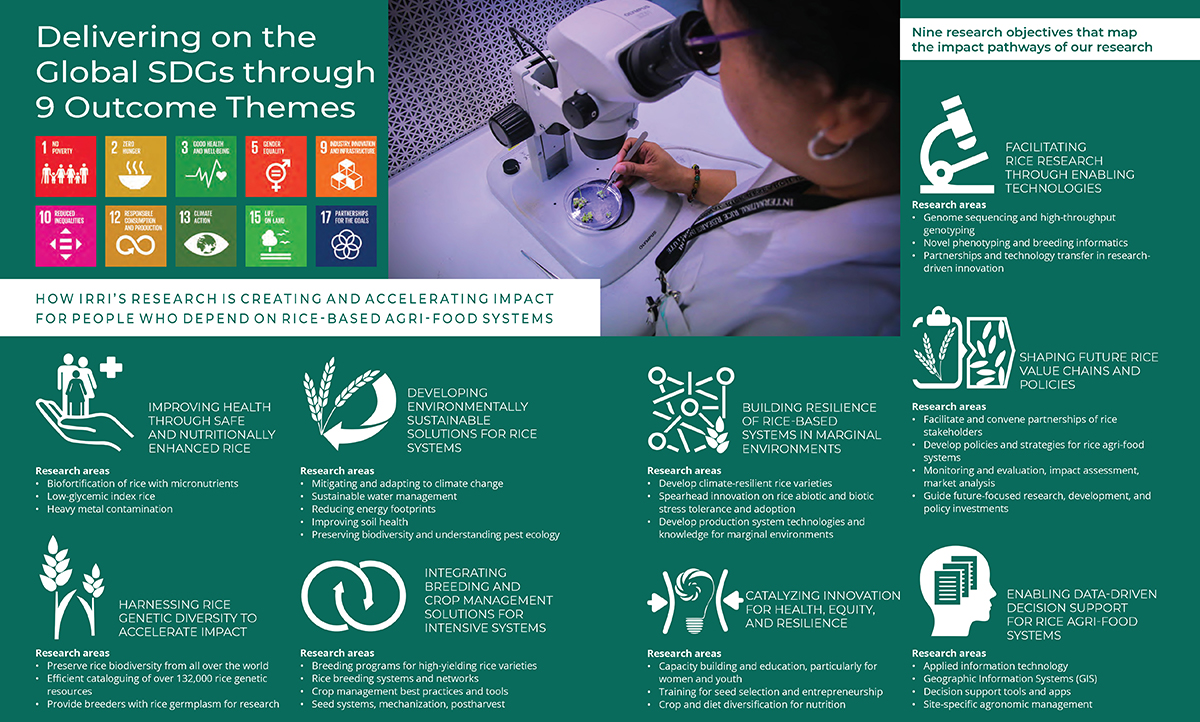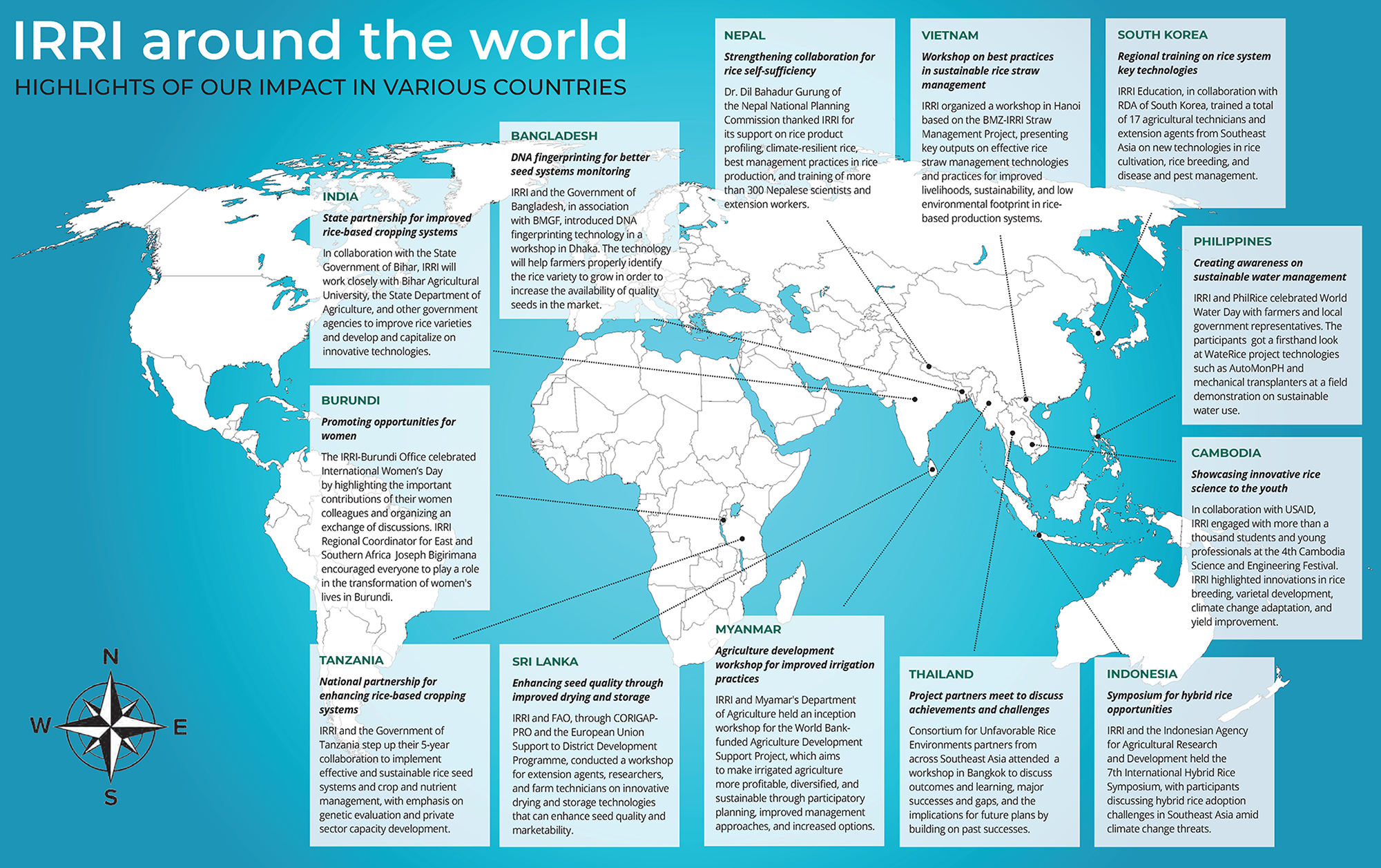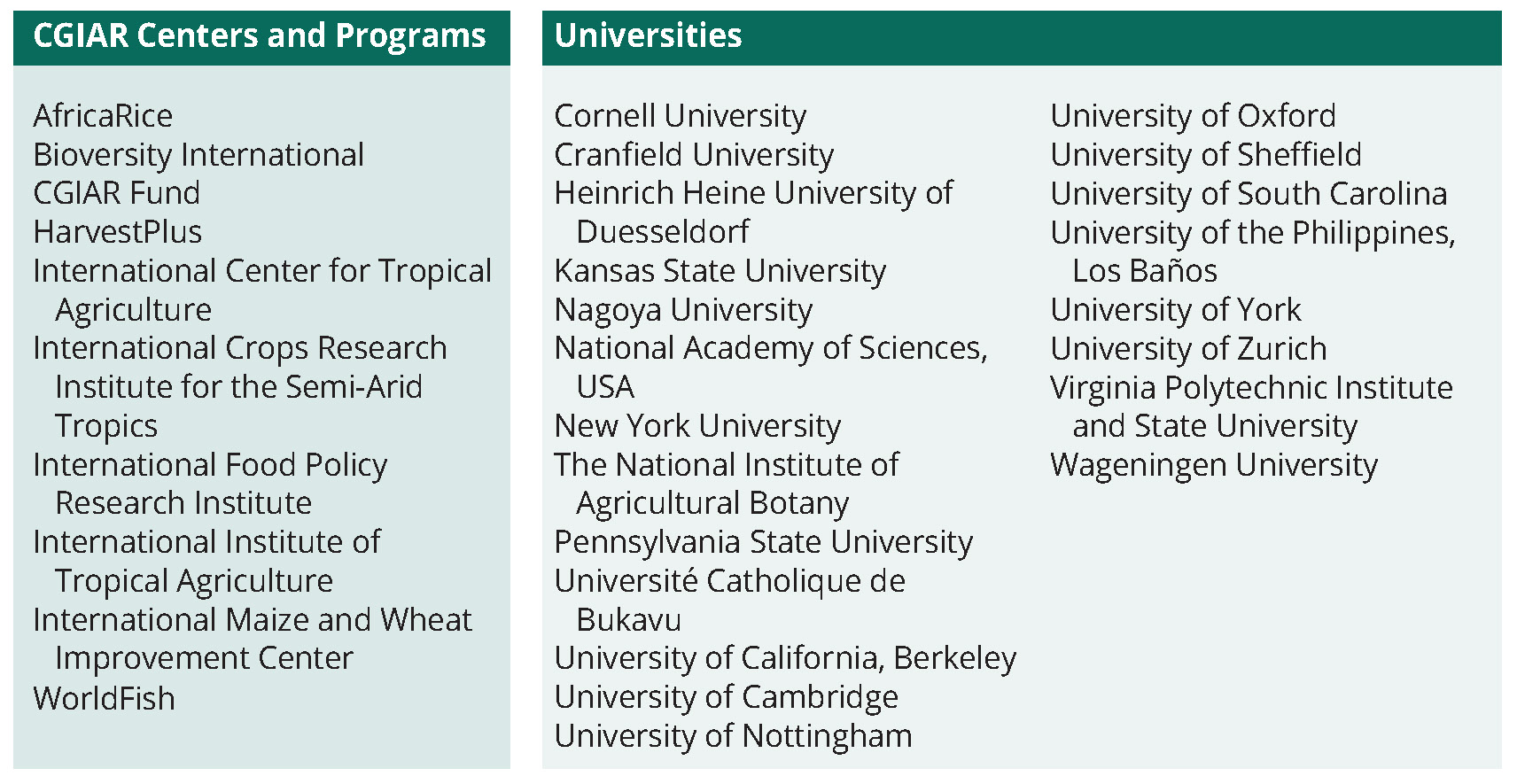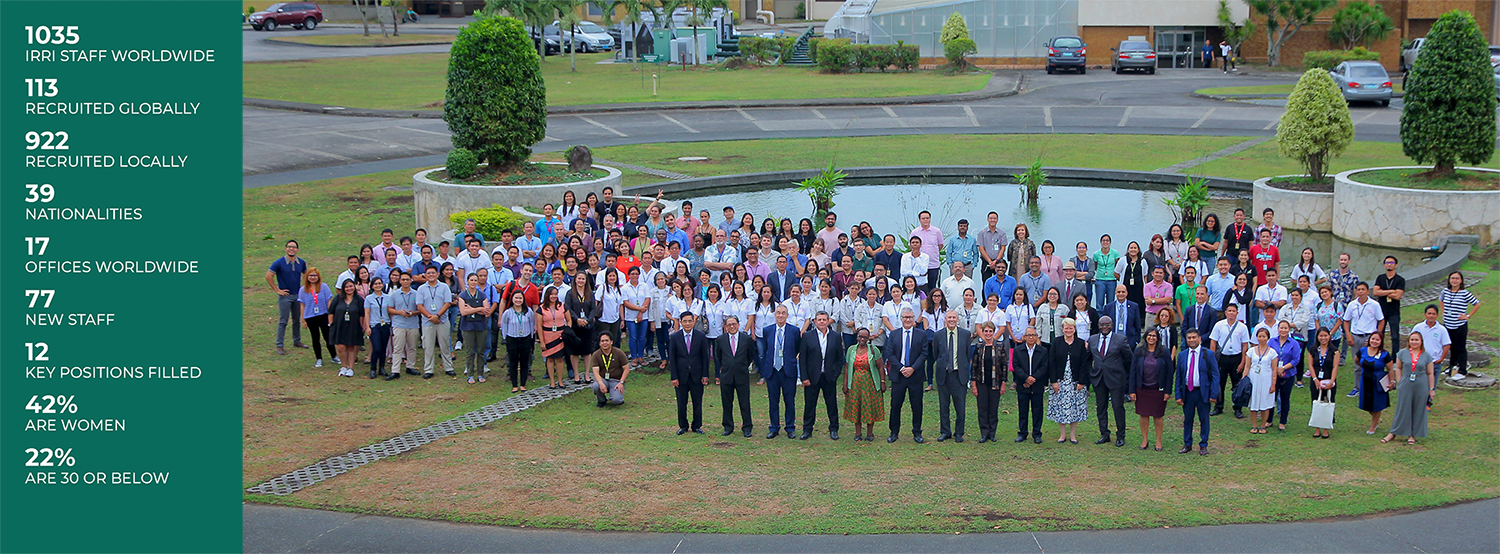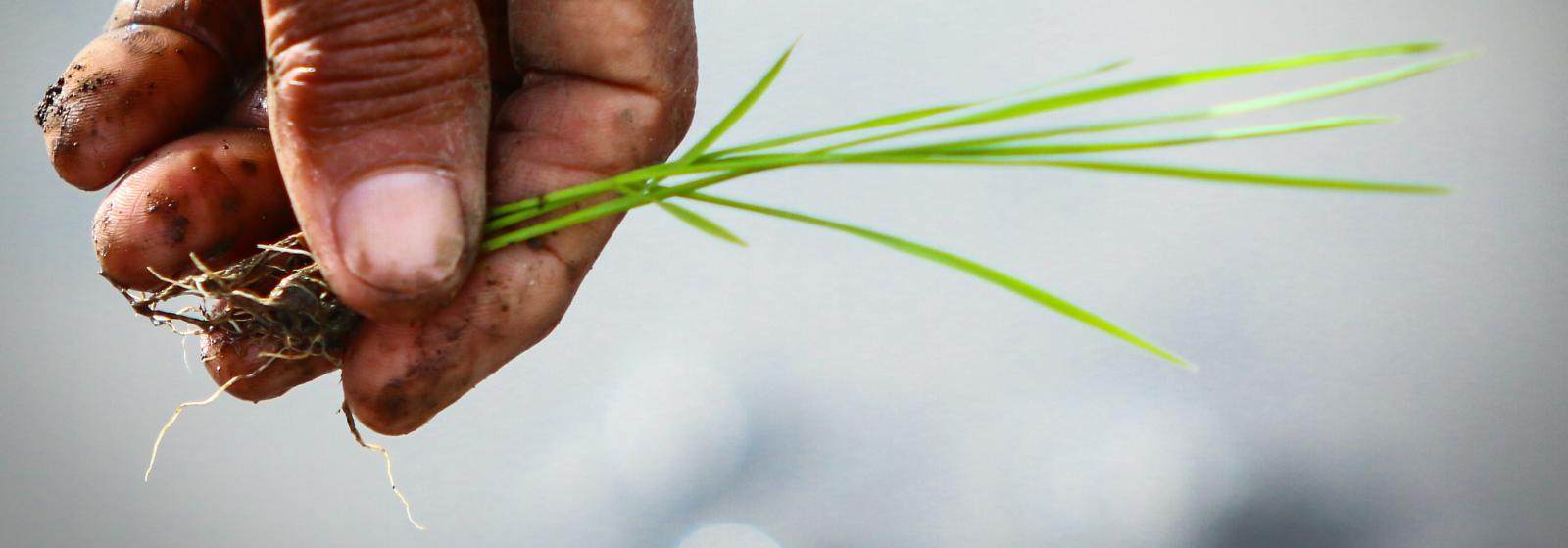
OUR MISSION
IRRI aims to improve livelihoods and nutrition, abolishing poverty, hunger, and malnutrition among those who depend on rice-based agrifood systems. In doing so, IRRI’s work protects the health of rice farmers and consumers, and the environmental sustainability of rice farming in a world challenged by climate change. IRRI’s work promotes the empowerment of women and supports opportunities for youth in an equitable agrifood system. Our research for development is characterized by its collaborative nature: f rom alliances with advanced research institutes; through strong collaborations and capacity development with governments and national agricultural research and extension systems; to partnerships with the development sector and our ability to broker novel delivery channels through the private sector. IRRI’s work is supported by a diverse network of investors aligned to common goals.
Goal 1
INNOVATION LEADERSHIP FOR THE GLOBAL RICE SECTOR
Be the linchpin of scientific innovation and thought leadership solving complex problems with deep research. Working with advanced research institutes and national partners around the globe we will discover, translate, and integrate deep scientific advancements that enable the adoption of technologies, practices, and policies to solve complex global problems and serve our beneficiaries in rice-growing countries and beyond.
Goal 2
CATALYZE IMPACT AT SCALE FOR PEOPLE AND PLANET
Create and support catalytic networks driving widespread adoption of high-impact innovations and technologies. Working across rice-growing countries in rural and urban communities, IRRI will speed up the translation of targeted innovations into the local rice value chain through partnerships, education, and technology to facilitate appropriate adoption, maximize impact in the shortest time, and produce substantive benefits for rice farmers, producers and consumers.
Goal 3
TRANSFORM RICE-BASED AGRI-FOOD SYSTEMS
Establish a track record of delivering successful policy interventions and institutional capacity building programs that underpin the development of equitable and sustainable rice sectors globally. Capitalizing on its scientific and capacity building prominence and track record of delivery, IRRI will purposefully engage with global actors to inform policies and establish standards and benchmarks that transform how food is cultivated, produced,and marketed in ricebased agri-food systems.
MESSAGE FROM THE DIRECTOR GENERAL

In the first full year of implementation of IRRI’s new strategic plan, we have begun to see the seeds of change take root and flourish. This year IRRI has broken new ground in research, stewardship of our most important genetic assets, and delivery of innovations in the countries and communities we serve.
IRRI’s integrated research agenda has been strengthened this year through the infusion of new talent, new strategies, and additional financial investments. We have welcomed several new senior leaders to the organization in 2018. Arriving from complimentary international organizations, our sister CG centers, and the private sector, they bring with them a range of expertise and experience that will broaden IRRI’s horizons and introduce new ideas and approaches. I am confident that these new points of view will propel IRRI’s research agenda forward to address the increasingly complex challenge of creating an equitable and sustainable global rice sector.
A great example of new approaches to our Research-for-Development mission is the transition we saw this year from two of our flagship research programs to an integrated global strategy for rice breeding.

A recently published study, which integrated a genome-wide association study with a large-scale transcriptome analysis, is helping predict genetic regions in rice that influence its glycaemic index (GI) and texture.

The world's largest rice germplasm collection received permanent funding for the conservation and sharing of over 132,442 varieties of the staple crop that feeds more than three billion people worldwide. The agreement between IRRI and the Crop Trust guarantees funding for the International Rice Genebank worth USD 1.4 million a year in perpetuity.

IRRI deepened its partnership with the Bill & Melinda Gates Foundation (BMGF) in a ground-breaking initiative to help hundreds of thousands of smallholder farmers in the developing world grow better rice crops and improve their livelihoods.

Prime Minister of India Shri Narendra Modi furthered his vision of doubling farmers’ incomes with the inauguration of the IRRI South Asia Regional Centre (IRRI SARC) in Varanasi, Uttar Pradesh.

Held on 15-17 October in Singapore, the 5th International Rice Congress (IRC2018) was the biggest gathering of thought leaders, scientists, policymakers, agriculture experts, and technology providers from the world of rice research and production.

IRRI opened a new regional office in Nairobi, Kenya to help Africa boost its rice productivity and self-sufficiency. Hosted by the International Livestock Research Institute and working closely with the Africa Rice Center (AfricaRice), the new regional hub will speed up IRRI’s ability to translate its 60-year history of success transforming the Asian rice sector to the African context.
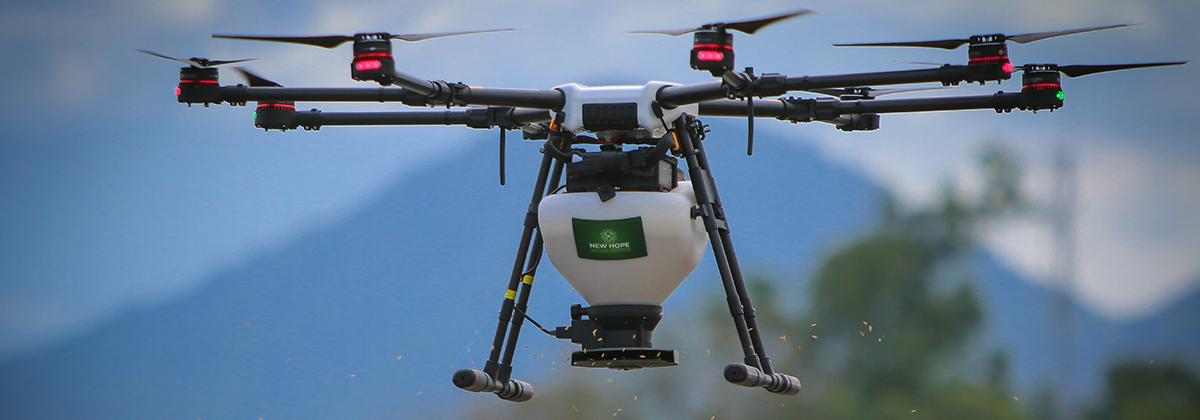
INNOVATE
BE THE LINCHPIN OF SCIENTIFIC INNOVATION AND THOUGHT LEADERSHIP SOLVING COMPLEX PROBLEMS WITH DEEP RESEARCH
As it works toward building a smarter and sustainable rice sector, IRRI draws on the strength of its innovation edge for new ideas that will address upcoming challenges in crop production and productivity. In 2018, IRRI partnered with government and private organizations in its relentless pursuit of innovations that benefit farmers and push the limits of rice science into new disruptive territories. These are some of the groundbreaking explorations centered on bringing the newest technology into the farmer’s field.

CONNECTING RICE FARMERS WITH SEED PRODUCERS IN ODISHA
IRRI, together with the Odisha Department of Agriculture and the Odisha State Seed Corporation, is connecting global innovative solutions to local needs through a mobile application and web-based Management Information System portal.
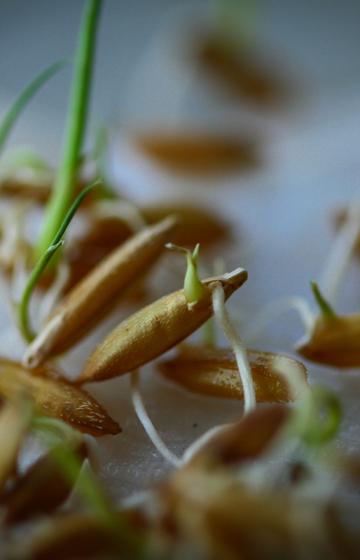
DISCOVERING NEW WAYS TO CONTROL A MAJOR RICE DISEASE
Bacterial blight is a major rice disease that severely affects rice production in Asia. In irrigated environments, bacterial blight can easily spread to large areas causing up to 30% in losses and a huge impact on the income of smallholder farmers.
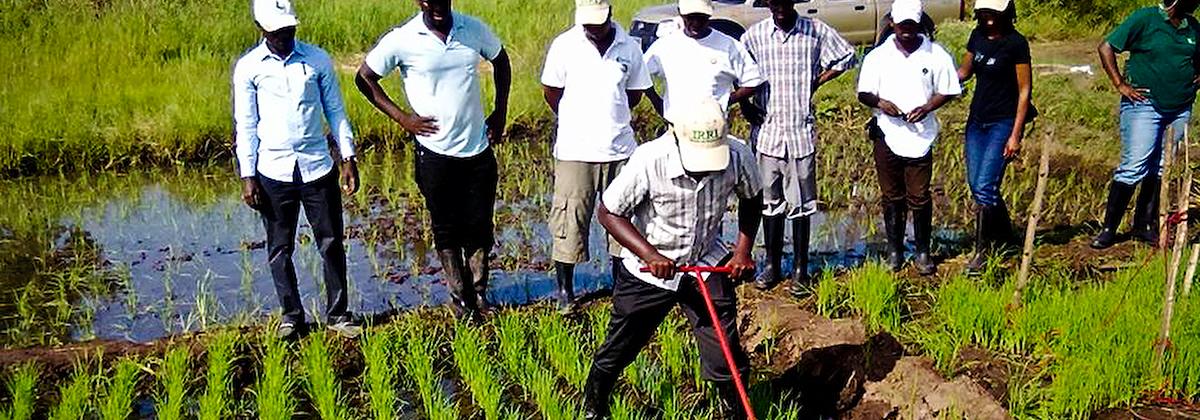
CATALYZE
CREATE AND SUPPORT CATALYTIC NETWORKS DRIVING WIDESPREAD ADOPTION OF HIGH-IMPACT INNOVATIONS AND TECHNOLOGIES
Integrating new techniques and technologies into traditional rice value chains can be slow and difficult to achieve. Agricultural practices and needs in different areas can vary greatly depending on a multitude of factors. IRRI and its partners are investing resources into localized, impact-driven initiatives to promote innovation, build up capacity, and support the development of governments, farmers, and stakeholders in rice-growing regions around the world.

EDUCATING INDIAN WOMEN FARMERS TO BE TECHNOLOGY INFLUENCERS
Eight participants from women self-help groups, women organizations, and producer companies attended training on advanced rice production to prepare them for their critical role as agents of change.
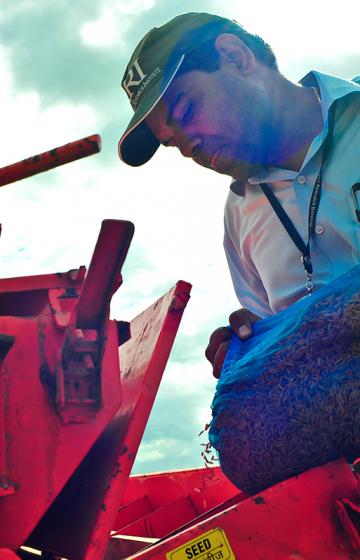
BRINGING INTENSIVE FARMING TECHNOLOGIES CLOSER TO NEPAL’S RICE FARMERS
Nepal has been IRRI’s partner in many initiatives that aim to transform the rice sector in Asia. However, most Nepalese farmers still practice traditional bullock-drawn and manual farming. These old mechanisms require more time and manual labor, but do not bring in much profit.

TRANSFORM
ENGAGE WITH GLOBAL ACTORS TO INFORM POLICIES AND ESTABLISH STANDARDS AND BENCHMARKS THAT TRANSFORM HOW FOOD IS CULTIVATED, PRODUCED, AND MARKETED IN RICE-BASED AGRI-FOOD SYSTEMS
Technological and scientific discoveries are providing new ways to better understand the impact of growing food and changing the way the world produces rice. IRRI combines its world-leading expertise in rice research with the distinctive strengths of its partners to make the discoveries that help improve the well-being of subsistence farmers while protecting the environment. In 2018, the institute’s innovative partnerships and collaborations have created new scenarios for a cleaner, healthier, and flourishing rice sector that serves as the cornerstone for ending poverty and hunger.
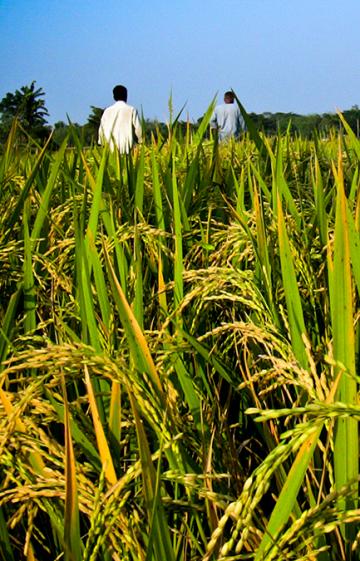
CREATING A DEEP AND LASTING IMPACT ON SOUTH ASIA AND AFRICA’S RICE PRODUCTIVITY
Stress-Tolerant Rice for Africa and South Asia (STRASA) is a 10-year project established by IRRI and AfricaRice in 2008. Its goal is to reduce poverty of at least 18 million farmers and stabilize rice production in drought- and flood-plagued and poor-soiled rainfed ecosystems in South Asia and Africa through the use of modern technology. In 2018, about 160 delegates from South Asia, Africa, Philippines, and the USA convened for the project’s 11th annual meeting to assess its successes, challenges, and milestones and set directions until its completion at the end of March 2019.
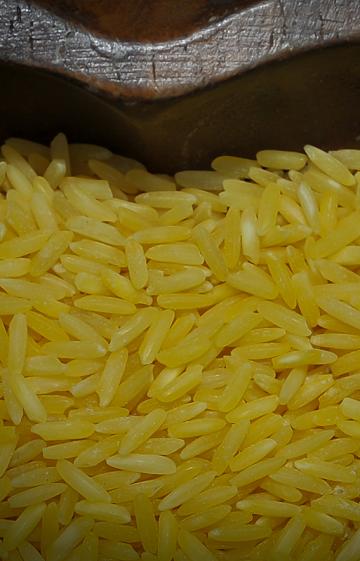
MEETING GLOBAL FOOD SAFETY STANDARDS
Golden Rice, a provitamin-A biofortified rice variety, completed its third positive food safety evaluation from the United States Food and Drug Administration (US FDA). The US FDA statement comes on the heels of the safety and nutrition approvals from Food Standards Australia New Zealand, and Health Canada making Golden Rice the first nutritionally enhanced genetically modified rice to receive regulatory approval for use in food.
Awards and Accolades

DR. RUARAIDH SACKVILLE HAMILTON RECEIVES CROP TRUST LEGACY AWARD
Ruaraidh Sackville Hamilton, former head of the International Rice Genebank, received the Crop Trust Legacy Award for his outstanding contribution in the field of plant genetic resources conservation. At IRRI, he was involved in safeguarding rice genetic resources, facilitating their effective and responsible use in compliance with international obligations, and developing new approaches to improve their conservation and use.
“This Legacy Award signifies a global recognition of the Institute’s work and commitment to conserve rice genetic diversity through the International Rice Genebank, which has been a significant force in shaping our future impact,” said Dr. Hamilton.

BANGLADESH HONORS DR. MD. M ABDUL MAZID FOR CONTRIBUTIONS TO NATIONAL FOOD SECURITY
The Bangladesh Government presented the Swadhinata Padak 2018 Award to Md. M Abdul Mazid, a former IRRI agronomist, for his work on rice research and development that helped improve food security in the country. Dr. Mazid was recognized for his work that spans over 40 years in developing the rice-based agri-food systems of Bangladesh. Among his accomplishments are mitigating Monga, the yearly cyclical phenomenon of poverty and hunger in Bangladesh, accelerating the development of rice varieties that can tolerate flash flooding, pioneering seed production, and training Bangladeshi farmers.
The Swadhinata Padak 2018 or Independence Award is the highest civilian honor the Prime Minister of Bangladesh bestows upon individuals who have made remarkable contributions in their respective fields.
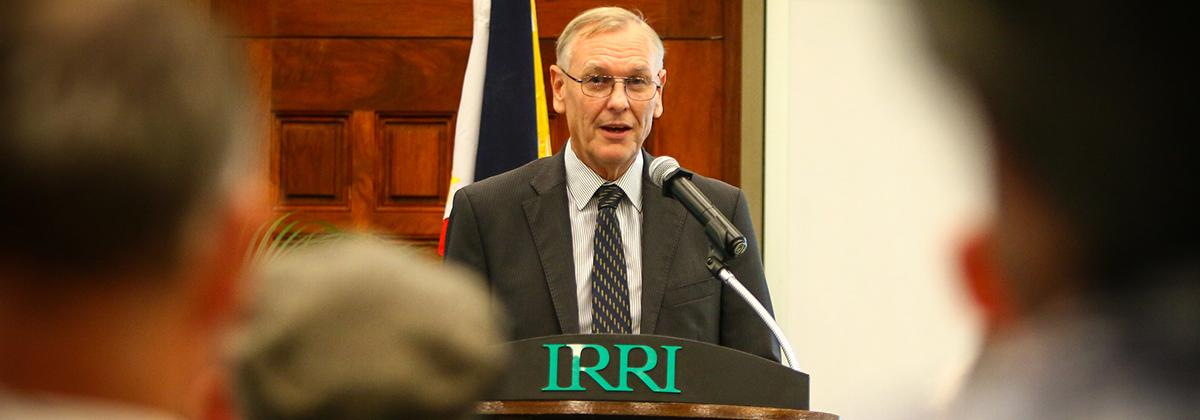
STATEMENT BY THE CHAIR OF THE IRRI BOARD OF TRUSTEES FOR 2018
In 2018, IRRI broke new ground with a range of achievements and activities. The institute strengthened its presence in new territories with the openings of the IRRI South Asia Regional Centre in India and the Africa Regional Office in Kenya. We secured landmark partnerships and funding from important stakeholders, like the Global Crop Diversity Trust and Bill and Melinda Gates Foundation (BMGF).In research we expanded the frontiers of rice science through advances in climatesmart tolerances, new populations and parental lines in hybrid rice, and big data for rice breeding.
OUR PARTNERS
We work with organizations and institutions from around the globe to drive research and innovation for humanity’s most important food crop. These partners provide valuable support and collaboration that expand and accelerate the institute’s impact to farmers and communities across the rice-growing world.
Great people, great purpose
At IRRI, people are our greatest asset. To deliver on our mission, we strive to hire and develop people who excel in their area of expertise, who are committed to the institute’s mission and purpose, and who relish working across boundaries— whether scientific, functional, geographic, or cultural—as part of a vibrant team.



